Home \ Knowledge Hub \ Focus on \ Focus On… World Rabies Day Awards 2017


01 Jan 2018
Focus On… World Rabies Day Awards 2017
SHARE

ALASDAIR KING
Executive Director, International Veterinary Health
For the second year, MSD Animal Health was pleased to be the sponsor for the World Rabies Day Awards in partnership with the Global Alliance for Rabies Control (GARC). The aim of these awards is to highlight the work done to end rabies in communities, and nominations are accepted from around the world. Over 80 individuals and organisations were put forward. Deciding on the shortlist was difficult as the dedication of all these people involved in the fight against rabies shone through, with so many examples of exceptional and outstanding work. Finally, after a lot of thought, three nominees were selected for each category and the final vote.
Deciding on the shortlist was difficult with the dedication shining through all the outstanding work in the fight against rabies. The response of one of the winners is exactly why we do it: “It is the recognition of the hard work of this team, which has the ideal of a better world, a world where animals and humans live without fear of diseases”.
The final winners were chosen by a panel made up of members of the CDC, WHO, OIE, FAO, GARC, and MSD Animal Health (and we extend a heartfelt thanks to those who were willing to give up their time to act as judges). In addition, all employees of MSD were able to cast a vote for an aggregated company nomination. Each award consists of US $1,200 or resources of equal value, an award plaque, and a certificate. This year we also introduced certificates of recognition for shortlisted entries.
You can get more information on the WRD awards here but here is a quick summary of 2017 winners:
Individual Awards
Asia: Dr. Rakesh Chand (Nepal)
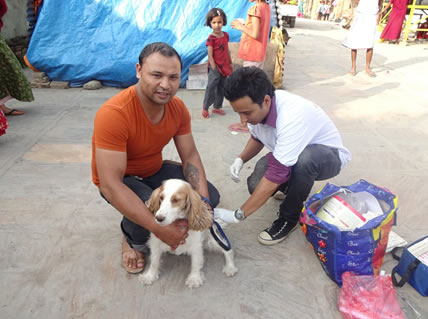
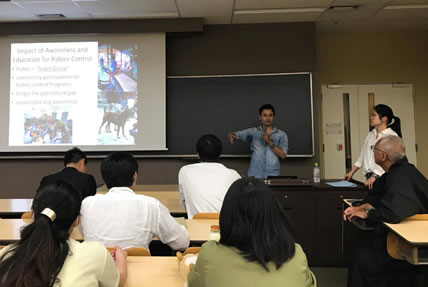
“Fighting against rabies is my passion, but a tough passion to follow. This award is a pat on my back, confirming I am on the right track. A motivation to push my efforts even more. I will be receiving this honour on behalf of Nepal […]. The dream for a rabies-free better tomorrow will continue.”
On hearing that he had won this year’s award, Dr. Rakesh Chand said: “Fighting against rabies is my passion, but a tough passion to follow. This award is a pat on my back, confirming I am on the right track. A motivation to push my efforts even more. I will be receiving this honour on behalf of Nepal, my fellow veterinarians, and the many organizations which are fighting tirelessly towards rabies control. The situation is bad, but the dream for a rabies-free better tomorrow will continue.”
Under Dr. Chand’s leadership, events and programmes have been organised which vaccinated more than 1,500 stray dogs. He functioned mainly around Chitwan, where his veterinary school was located, and later in Kathmandu, where he worked and lived. Awareness programmes have reached about 2,000 school students directly through educational classes but radio shows might have impacted tens of thousands of people.
Sub-Saharan Africa: Mr. Mawethu Kunyu (South Africa)
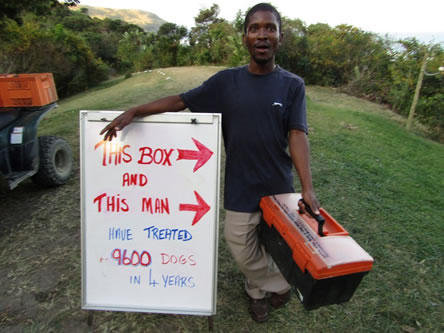
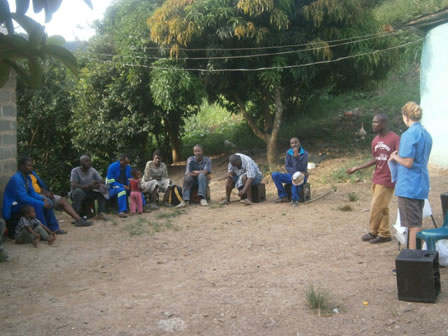
Mawethu has been working in the region since 2009 when he started training as an Animal Welfare Assistant. Since then he has become the “go-to” person for all things related to cats and dogs. He has completed both the GARC Animal Handling and Vaccination Certificate and the GARC Rabies Educator Certificate. Mawethu conducts regular outreach activities to administer vaccinations and educate communities on how to recognise rabies. This has led to improved awareness and reporting of suspected rabies cases.
MEEREB: Mr. Bojan Veselica (Bosnia & Herzegovina)
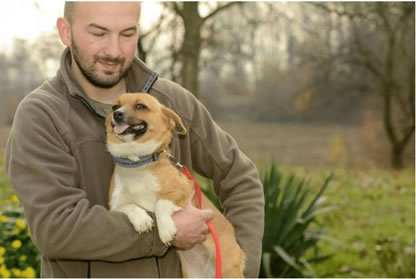

“This award […] re-energises the continuation of this important work. In my country of Bosnia, rabies is almost nonexistent thanks to our ongoing fight against it. However, there is a growing problem with strays throughout the country which raises the risk. Funding of rabies vaccination for these strays is a constant struggle.”
Bojan started visiting Prnjavor public shelter because he loved dogs and knew that the dogs were starving or being fed nothing but stale white bread. They were also not getting any veterinary treatment, rabies vaccinations, or sterilisation. The conditions were catastrophic. He paid for the dogs to get vaccinated and sterilised and, slowly with the help of Facebook and supporters from around the world, he was able to fundraise to improve conditions considerably and to move the dogs to a much better facility. A priority has always been adequate vaccination to prevent rabies and other diseases, and it is his first priority for any dog from the area that is brought to the shelter.
Bojan said: “Receiving this award and great honour not only raises my morale but also re-energises the continuation of this important work. In my country of Bosnia, rabies is almost nonexistent thanks to our ongoing fight against it. However, there is a growing problem with strays throughout the country which raises the risk. Funding of rabies vaccination for these strays is a constant struggle, and therefore the fund granted with this award will not only enable me to proceed with this essential work in my region of Prnjavor, Bosnia Herzegovina, but will maintain an awareness as to the importance of eradicating rabies worldwide.”
Americas: Dr. Kelly Crowdis (Haiti)
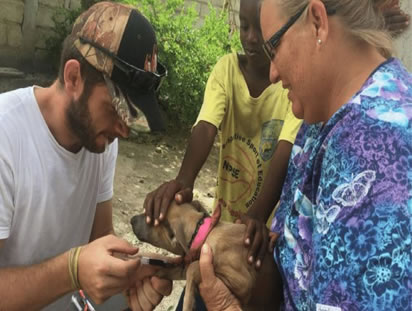
Dr. Kelly Crowdis is a veterinarian who has committed her life to serving the people of Haiti and improving the lives of the people and animals in the community. She works as a field coordinator and collaborates with the CDC, Haitian government, and Christian Veterinary Mission to implement public health interventions, the primary goal of which is rabies surveillance, control, and prevention. Dr. Crowdis has also created and opened a veterinary school in order to increase the presence of veterinary medicine within the community. She works tirelessly on rabies control and prevention, helps educate her community, and is wholly committed to eradicating rabies.

“We plan to use these funds to […] to fund a human rabies vaccine bank for persons who cannot afford the vaccine or travel expenses for vaccination, since the vaccine is only available in metropolitan centers. It will also support the purchase of training materials for our childhood rabies prevention school course.”
Dr. Crowdis said: “I am honoured to be a recipient of a 2017 World Rabies Day Award and to receive this acknowledgement from the global community for the great strides Haiti has made to control canine rabies. The progress we have made would not be possible without Dr. Max Millien, Agr. Ing. Ludder Fleurinors, and Vet Tech. Pierre Dilius in the Haitian Ministry of Agriculture. We plan to use these funds to market a local, ethically produced artisanal product which will be distributed internationally to create a sustainable income to fund a human rabies vaccine bank for persons who cannot afford the vaccine or travel expenses for vaccination, since the vaccine is only available in metropolitan centers. It will also support the purchase of training materials for our childhood rabies prevention school course, which educates over 5,000 children annually.”
Organisation Awards
Asia: Nowzad (Afghanistan)
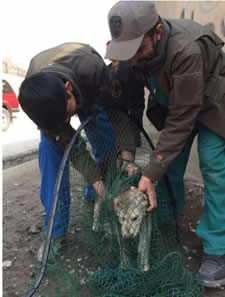
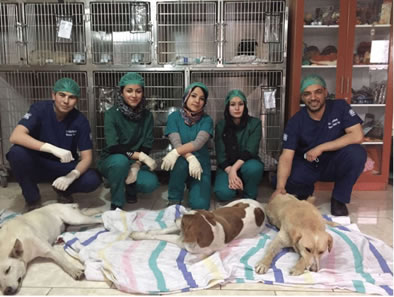
“As a small charity it means the world to us that our vital work effectively reducing rabies in Afghanistan for the past 10 years has been recognized.”

“As a small charity it means the world to us that our vital work effectively reducing rabies in Afghanistan for the past 10 years has been recognized.”
Some of the successes of Nowzad include:
- Over 200 veterinary students trained in rabies prevention
- Rabies prevention schemes carried out in 4 migrant camps so far
- Rabies prevention schemes carried out in 6 villages
- Successful rabies prevention programme in force in the UK and US embassies as well as resolute support bases
- Over 500 cattle successfully vaccinated against rabies
- Over 1,000 cats successfully vaccinated against rabies
- Over 2,000 dogs successfully vaccinated against rabies
- Over 300 children and teenagers educated in the danger of rabies
On hearing of the award, the response was: “The Nowzad Team is incredibly honoured to be awarded the esteemed ‘Organisation – Asia World Rabies Day Award 2017.’ As a small charity it means the world to us that our vital work effectively reducing rabies in Afghanistan for the past 10 years has been recognized. This award has further inspired our resolve to work towards ending rabies for not only the dogs, but the cats, cattle, and of course, people of Afghanistan too. Thank You.”
Sub-Saharan Africa: Lilongwe Society for the Protection and Care of Animals (Malawi)
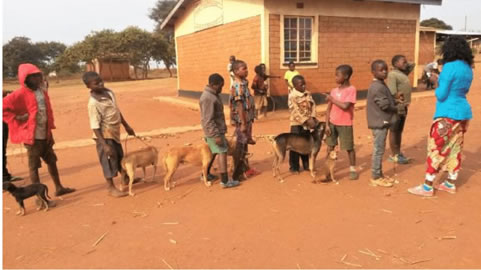
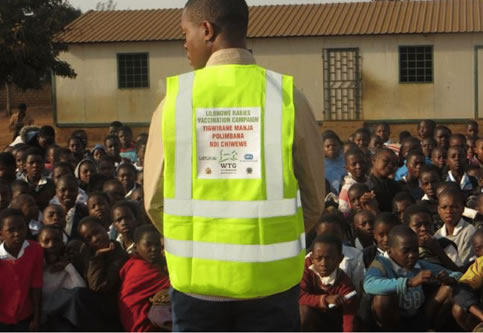
Lilongwe Society for the Protection and Care of Animals (LSPCA) was set up in 2008 when the Ministry of Agriculture and Food Security gave its backing to a group of individuals who were concerned about the level of welfare given to animals in Malawi. In October 2010 they became the first domestic animal welfare organization registered in Malawi. They are a nonprofit organisation based in Lilongwe dedicated to veterinary care and animal welfare, building compassion for animals in Malawi through public awareness campaigns, humane education, veterinary support and by promoting the enforcement of the Animal Protection Act .
LSPCA has conducted a 3-year-long Urban Rabies Vaccination Campaign in Lilongwe aimed at vaccinating at least 70% of the city’s dog population, and in 2017 vaccinated 35,610 dogs. The campaign was accompanied by widespread educational efforts, which were conducted by a trained education team of 30 people. Since children are the main caretakers of animals in Malawi, they are especially in need of extensive educational work. Over the course of the campaign, more than 400,000 pupils were informed at vaccination sites about the dangers and risks of rabies. Furthermore, the wider public was reached through posters, leaflets, and banners, as well as media activities (press releases, radio/TV spots).
MEEREB: KOARP (Iraq)
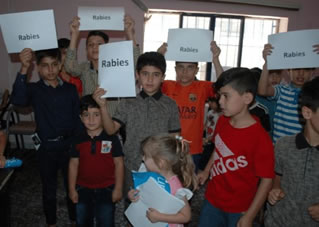
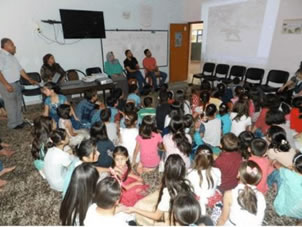
KOARP is a professional, volunteer, independent organisation interested in animal rights protection. Its main goal is to protect animal rights and help neglected animals by providing veterinary care, while also protecting people and the environment. They organise seminars, slide shows, fun quizzes, and interactive games in kindergartens, schools, and children’s centers about zoonotic disease and rabies, as well as informing and interacting with the public via social media (newspapers, magazines, TV, radio, Facebook, Twitter etc.) about zoonotic diseases and rabies.
KOARP also won the award for the region last year and with the prize has held a workshop for farmers on zoonotic diseases and rabies control and an education programme for more than 200 children at orphan kids’ centers and schools.
Americas: Suvis São Miguel Paulista (Brazil)
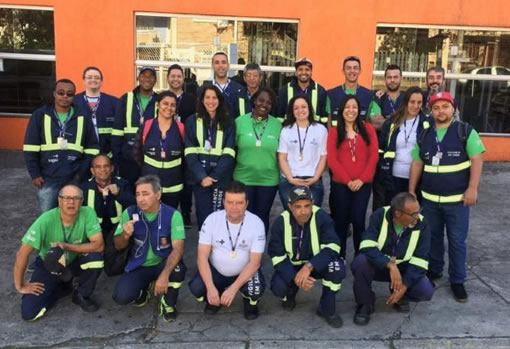
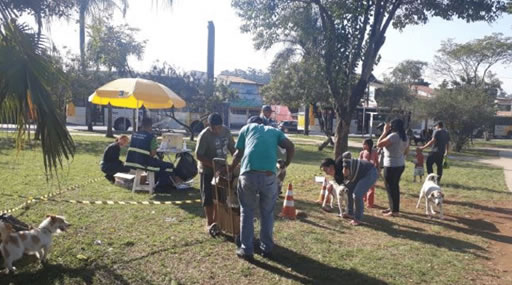

“It is more than a prize for us, it is the recognition of the hard work of this team, which has the ideal of a better world […] where animals are not sacrificed for fear of transmitting the fatal disease.”
As winners this year, the Suvis São Miguel Paulista team plans to use the award to improve education in local public schools, recognising that the education of children is the door to broaden the vision and care that the community in general must have related to disease. The resource will be destined to the preparation of educational guides of Rabies in Animals and Humans. They said: “We want to thank you for this award, because it is more than a prize for us, it is the recognition of the hard work of this team, which has the ideal of a better world, a world where animals and humans live without fear of diseases, a world where animals and humans are left side by side without a virus that disturbs, a world where animals are not sacrificed for fear of transmitting the fatal disease.”
ALASDAIR KING
Executive Director, International Veterinary Health
The views and opinions expressed in this article are those of the authors.

